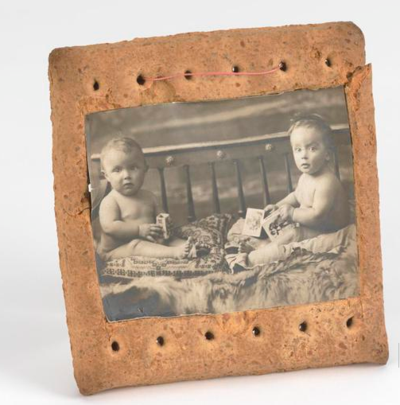Remembrance under attack

A picture frame fashioned from a ration biscuit by Sgt Herring, containing a picture of his children, 1915.
By THEA LENARDUZZI
On Saturday, as David Cameron stooped to plant the final poppy in the Tower of London’s “Blood Swept Lands and Seas of Red”, a line from Rudyard Kipling came to mind: “Our England is a garden, and such gardens are not made / By singing: – ‘Oh, how beautiful!’ and sitting in the shade”.
The centenary celebrations seem to have largely focused (for better or worse) on the poppies at the Tower, perhaps causing a distraction from developments elsewhere. Cameron announced that two sections of the display would remain until the end of the month before going on a national tour and ending, in 2018, with a permanent exhibition at the Imperial War Museum (“I think the right place for it to be”). His coalition government, meanwhile, has decided on a £4m cut to the annual funding of the same museum.
Coming just months after the museum’s reopening following a vast refurbishment, the cuts will result in the loss of up to eighty jobs (which will make it increasingly unlikely that the various IWM branches – Duxford, HMS Belfast and the Churchill War Rooms – will be able to accept school visits, for example), as well as the closure of the museum’s library.
The closure of the library is a particularly astonishing way to mark the cententary of the war. The IWM's collection includes over 600,000 items – from photographs, paintings and sound recordings (made in the 1960s and 70s) with veterans of the First World War, to a letter dated November 20, 1914, from Rupert Brooke to Walter de la Mare, in which the poet expresses his fear of England being invaded (“But I’d enjoy fighting in England. How one could die!”), and grave markers carrying the “old lie”. The library is an irreplaceable resource for academics and members of the public researching not only the First World War, but all subsequent conflicts involving Britain and the Commonwealth.
As Freud pointed out, flowers have neither emotions nor conflicts. It falls to us to imbue them with these, and there is perhaps no more successful example of our doing so than the poppy, which, ever since John McCrae’s rondeau first appeared in Punch in December 1915, has become the emblem of our yearly acts of remembrance. Poppies – in their hundreds of thousands or in their singular form as badges – are merely one branch of remembrance, however, and as such are utterly reliant on the experience of war itself, documented in myriad, often unforeseeable ways (for example, pictured above, the army biscuits turned to a more inspired purpose).
But if it must be poppies, you'll find plenty in the IWM’s collections, a rudimentary search of which turned up a letter from Bill, on the Western Front – “hell on Earth” – to his wife Louise Fletcher, dated July 10 1918, with a pressed poppy enclosed (“This I plucked while I was convalescent: a souvenir from France”). You'll also find the notebooks in which Isaac Rosenberg drafted “So shut out are our lives” and “On Receiving News of the War”, as well as a first edition, from 1915, of his privately published pamphlet, Youth. These ephemera are at the roots of any war and if we do not tend to them, any worthwhile remembrance of the whole will struggle to survive.
The Prospect union, representing the IWM, has launched a petition, asking the government to reverse the cuts (you’ll find it here). Before both Kipling and Freud, Cicero put it nicely: “If you have a garden and a library, you have everything you need”.
Peter Stothard's Blog
- Peter Stothard's profile
- 30 followers



